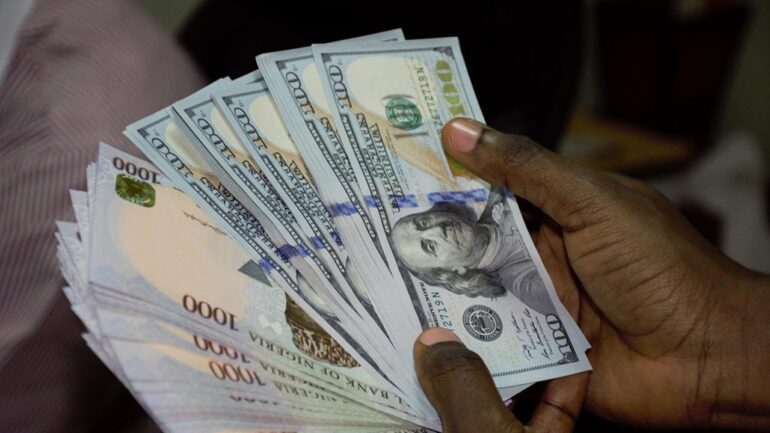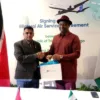The naira, on Monday, continued its appreciation against the dollar at the Nigerian Autonomous Foreign Exchange Market (NAFEM), the country’s official exchange rate window, as it closes at N750.14/$1.
The rate represents a recovery of N41.61k from the N791.75 recorded last Friday.
However, on the parallel market, popularly called black market, the naira fell to N1,140 per dollar following increased demand for the greenback by the end users.
This represents 0.44 percent weaker than N1,135 per dollar exchanged on Friday on the same market. Some traders at CMS sold dollars at N1,100 during the morning trading session. At Ibadan, one dollar was sold for N1,150 and at the Lagos Airport it went for N1,145/$1.
Naira free falls peaked at N1,310 per dollar on October 24, 2023 before strengthening to N1.020/$1 on November 3, 2023, according to data compiled by BusinessDay.
According to Data from FMDQ Securities Exchange, a platform that oversees foreign exchange (FX) trading in Nigeria, the local currency hit an intra-day trading high of N1,120 and a low of N701.
FMDQ said transactions opened at the rate of N791.75 to the dollar and closed at N750.75.
Although the rate is still unpalatable to the business community and Nigerians at large, the naira began its recovery movement against the dollar after the federal government said Saudi Arabia plans to provide substantial financial support for Nigeria’s foreign-exchange reform process.
“To support the central bank’s ongoing reforms of Nigeria’s foreign-exchange regime, the Saudi government will make available a substantial deposit of foreign exchange to boost Nigeria’s forex liquidity,” Information minister Mohammed Idris said.
Also, over the weekend, President Tinubu departed for Berlin, Germany, to attend the G-20 Compact with Africa (CwA) Conference.
Nigeria, being Germany’s second-largest trading partner in Africa, has seen bilateral trade volume rise from two to three billion Euros between 2021 and 2022.
The conference, hosted by German Chancellor Olaf Scholz, will bring together heads of state and government from CwA member countries, bilateral partners, and heads of international organisations to discuss measures to enhance economic and business cooperation.
During the conference, discussions will focus on boosting investments in critical areas such as energy, trade, infrastructure, and new technologies.
However, speaking to investors in Berlin, Germany, on Monday, President Tinubu, told international investors that beyond Nigeria’s natural resources, the people of Nigeria, who are highly educated, skilled, and naturally industrious, are the primary asset and advantage the country wields over other nations in the global race for new investments.
The President who spoke at a panel discussion titled, “Fostering local value chains and investments in Africa – The role of the German private sector”, the President, noted that while promoting the rule of law is crucial for attracting foreign investments, Nigeria’s energetic youth population and well-educated populace represent the greatest incentive provided to investors toward the mutually-beneficial replication of China’s economic resurgence.
“We are dogged in our pursuit of natural gas development today, in tandem with hydrogen production for tomorrow. The world knows Nigeria as a leader in the energy sector. Our vast gas deposits and business-friendly environment make us an attractive investment destination. But we are going a step further now. We are creating fiscal responsibility and tax reforms as we reform our financial institutions to expeditiously accommodate foreign investments.
”We are eager and ready to partner with you. We have the youngest, largest, and most vibrant youth population in Africa. Equally, we have every ingredient required in the making of a modern economy: a well-educated population, a massive market, and the political will to bring it all together under my leadership.”


